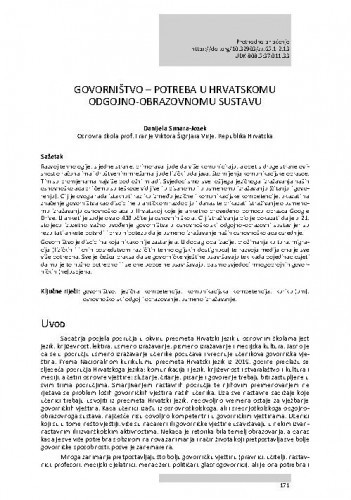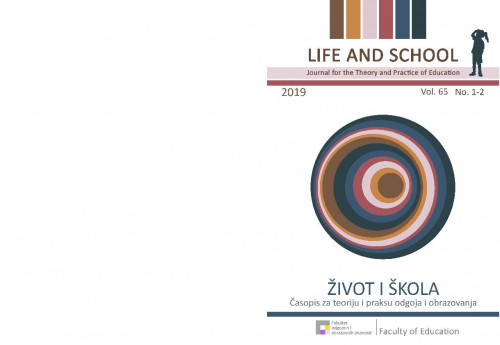Razvoj tehnologije, s jedne strane, primorava ljude da više komuniciraju, a opet s druge strane ovisnost o računalima i društvenim mrežama ljude fizički udaljava, što mijenja komunikacijske obrasce. Tim su promjenama najviše podložni mladi. Svjedoci smo sve lošijega jezičnoga izražavanja naših osnovnoškolaca pri čemu su teškoće vidljive i u pisanomu i u usmenomu izražavanju (čitanju i govorenju). Cilj je ovoga rada istaknuti razliku između jezične i komunikacijske kompetencije, ukazati na značenje govorništva kao discipline u antičkom razdoblju i danas te prikazati istraživanje o usmenomu izražavanju osnovnoškolaca u Hrvatskoj koje je anketno provedeno pomoću obrasca Google Drive. U anketi je sudjelovalo 438 učitelja osnovnih škola. Cilj istraživanja bio je pokazati da je u 21. stoljeću izuzetno važno uvođenje govorništva u osnovnoškolski odgojno-obrazovni sustav jer su rezultati ankete potvrdili prvu hipotezu da je usmeno izražavanje naših osnovnoškolaca osrednje. Govorništvo je disciplina koja nikako nije zastarjela. U doba globalizacije, prožimanja kultura, migracija (fizičkih ili onih posredstvom različitih tehnologijskih dostignuća) te razvoja medija ona je sve više potrebna. Sve je češća praksa da se govorničke vještine usavršavaju tek kada pojedinac osjeti da mu je to nužno potrebno ili se one uopće ne usavršavaju, pa smo svjedoci mnogobrojnih govorničkih (ne)uspjeha.; Technological development, on the one hand, allows people to communicate more, and yet on the other hand computers and social networks dependency, physically separates people, which changes communication patterns. Young people are the ones who are subject of the changes mentioned before. We are witnessing deterioration in language expression of our primary school pupils, where difficulties are evident in both writing and oral expression (reading and speaking). The aim of this paper is to highlight the difference between language and communication competence, to point out the importance of oratory as a discipline in the ancient period and today, and to present a survey of oral expression of primary school pupils in Croatia which was done through the Google Drive Form. 438 primary school teachers were involved in the survey. The aim of the research was to show that in the 21st century it is extremely important to introduce oratory into the primary school educational system because the survey results confirmed the first hypothesis that the oral expression of our primary school pupils is mediocre. Oratory is a discipline that is by no means outdated. At this time of globalization, intertwining culture, migration (physical or through different technological achievements) and the development of media, this discipline is increasingly needed. More common practice is to improve oratory skills only when an individual feels he needs them or they are not perfected at all, so we are witness to numerous oratory (un)successes.; Durch die stetige Entwicklung der Technologie sind die Menschen einerseits immer mehr auf Kommunikation angewiesen, andererseits werden sie durch Abhängigkeit von Computern und sozialen Netzwerken im wahren Leben immer mehr voneinander entfernt, was wiederum die Kommunikationsmuster beeinflusst. Vor allem junge Menschen sind von diesen Veränderungen betroffen. Wir sind Zeugen eines immer schlechteren sprachlichen Ausdrucks unserer Schüler, wobei sich die Schwierigkeiten im schriftlichen und mündlichen Ausdruck bemerkbar machen (Schreiben und Sprechen). Das Ziel dieser Arbeit ist es den Unterschied zwischen der Sprach- und Kommunikationskompetenz hervorzuheben, auf die Bedeutung der Rhetorik als Disziplin seit der Antike bis heute hinzuweisen und die Ergebnisse der Studie zum mündlichen Ausdruck von Primar- und Sekundarstufenschülern in Kroatien zu präsentieren. Die Umfrage wurde mittels Google Drive durchgeführt und 438 Lehrer der Primarstufe und Sekundarstufe I nahmen teil. Das Ziel der Untersuchung war zu beweisen, dass es im 21. Jahrhundert außerordentlich wichtig ist, Rhetorik in diese Schulstufen einzuführen, da die Ergebnisse die Anfangshypothese bestätigt haben, nämlich dass der mündliche Ausdruck unserer Schüler nur mittelmäßig ist. Die Rhetorik ist keinesfalls eine veraltete Disziplin. Im Zeitalter der Globalisierung, des gegenseitigen Durchdringens der Kulturen, der Migration (im Raum oder mittels unterschiedlichen technologischer Leistungen) und der Entwicklung der Medien steigt der Bedarf daran. Immer öfter beginnen Individuen ihre Redekunst erst dann zu verbessern, wenn sie spüren, dass dies zur Notwendigkeit geworden ist, oder aber gibt es viele, die sie gar nicht erst weiterentwickeln, weshalb wir Zeugen zahlreicher rednerischer Misserfolge sind.
Sažetak

 Život i škola : časopis za teoriju i praksu odgoja i obrazovanja 65,1-2(2019) / glavna i odgovorna urednica, editor-in-chief Vesnica Mlinarević.
Život i škola : časopis za teoriju i praksu odgoja i obrazovanja 65,1-2(2019) / glavna i odgovorna urednica, editor-in-chief Vesnica Mlinarević.